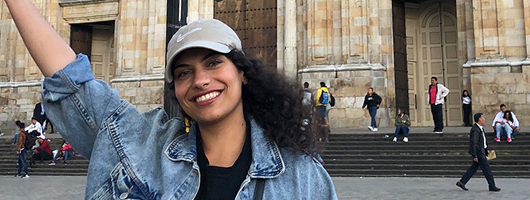 Pictured | Amna Al-Shawi | Bachelor of Arts in Spanish / Minor in Latin American Studies | Granger, Indiana (hometown)
Pictured | Amna Al-Shawi | Bachelor of Arts in Spanish / Minor in Latin American Studies | Granger, Indiana (hometown)
Volunteer Activities | El Campito Daycare, Spanish tutor, Embedded Tutor
Club Affiliations | Spanish Club, International Student Organization, Latino Student Union (IU South Bend)
Athletic Participation | IU South Bend Women's Soccer
Photo credit | Amna Al-Shawi | Photo taken in Bogota Colombia, Summer 2019
Minor in Latin American/Latino Studies
Minor Requirements (18 cr. minimum)
All courses are 3 credit hours, unless otherwise noted.
The Minor in Latin American/Latino Studies consists of a minimum of 18 credits distributed as follows:
- Two Core Courses (6 cr.)
- Three electives (9 cr.)
- SPAN-S 203 Second Year Spanish 1 (or equivalent)
Core Courses (6 cr.)
Select two courses in Latin American history, politics, society, or culture:
- ANTH-E 300 Culture Areas and Ethnic Groups
VT: Peoples and Cultures of Latin America - ANTH-E 335 Ancient Civilizations of Mesoamerica
- HIST-F 300 Issues in Latin American History
- HIST-H 211 Latin American Culture and Civilization 1
- HIST-H 212 Latin American Culture and Civilization 2
- POLS-Y 330 Central American Politics
- POLS-Y 337 Latin American Politics
- SOC-B 399 Human Behavior and Social Institutions
VT: World Societies and Cultures (Mexico/Costa Rica) - SOC-S 362 World Societies and Cultures (Mexico or Costa Rica)
- SPAN-S 275 Hispanic Culture and Conversation
- SPAN-S 302 The Hispanic World 2
- SPAN-S 313 Writing Spanish 1
When content applies - SPAN-S 314 Writing Spanish 2
When content applies - SPAN-S 317 Spanish Conversation and Diction Class
When content applies - SPAN-S 363 Introducción a la Cultura Hispánica
- SPAN-S 412 Spanish America: The Cultural Context
- SPAN-S 477 Modern Spanish-American Prose Fiction
- SPAN-S 494 Individual Readings in Hispanic Studies
When content applies - SPAN-S 495 Hispanic Colloquium
When content applies
Electives (9 cr.)
The nine credit hours of electives may be drawn from the following courses or an approved substitute, but no more than one course at the 100–level. Students seeking to apply a course with a comprehensive international theme to the minor should be able to show that a portion of their work, such as a term paper or similar assignment, dealt directly with a Latin American/Latino topic. To preserve the minor’s interdisciplinary focus, courses must be drawn from at least two departments.
Anthropology
- ANTH-A 385 Topics in Anthropology (where topics have a Latin American/Latino focus)
- ANTH-E 300 Culture Areas and Ethnic Groups
VT: Peoples and Cultures of Latin America - ANTH-E 335 Ancient Civilizations of Mesoamerica
Communication
- SPCH-S 427 Cross Cultural Communication
- TEL-R 404 Topical Seminar in Telecommunications
When content applies
English
- ENG-L 379 American Ethnic and Minority Literature
History
- HIST-A 352 History of Latinos in the United States*
- HIST-F 300 Issues in Latin American History
- HIST-J 495 Proseminar for History Majors (where topics have a Latin American/Latino focus)
- HIST-H 211 Latin American Culture and Civilizations 1
- HIST-H 212 Latin American Culture and Civilizations 2
- HIST-T 190 Literary and Intellectual Traditions (where topics have a Latin American/Latino focus)
- HIST-T 390 Literary and Intellectual Traditions (where topics have a Latin American/Latino focus)
Political Science
- POLS-Y 324 Women and Politics (where topics have a Latin American/Latino focus)
- POLS-Y 330 Central American Politics*
- POLS-Y 337 Latin American Politics*
- POLS-Y 343 The Politics of International Development
Psychology
- PSY-P 391 Psychology of Gender and Ethnicity (where topics have a Latin American/Latino focus)
Sociology
- SOC-S 335 Race and Ethnic Relations (where topics have a Latin American/Latino focus)
- SOC-S 362 World Societies and Cultures (Mexico/Costa Rica)
- SOC-S 410 Advanced Topics in Social Organization
VT: International Inequalities and Global Issues (where topics have a Latin American/Latino focus)
Spanish
- SPAN-S 204 Second-Year Spanish 2 (for non-College of Liberal Arts and Sciences students)
- SPAN-S 275 Hispanic Culture and Conversation
- SPAN-S 302 The Hispanic World 2
- SPAN-S 303 The Hispanic World
- SPAN-S 313 Writing Spanish 1
When content applies - SPAN-S 314 Writing Spanish 2
When content applies - SPAN-S 317 Spanish Conversation and Diction
When content applies - SPAN-S 363 Introducción a la Cultura Hispánica
- SPAN-S 412 Spanish America: The Cultural Context
- SPAN-S 416 Modern Hispanic Poetry
When content applies - SPAN-S 477 Modern Spanish-American Prose Fiction
- SPAN-S 494 Individual Readings in Hispanic Studies
When content applies - SPAN-S 495 Hispanic Colloquium
When content applies - SPAN-S 496 Foreign Study in Spanish (in Latin America)
- SPAN-T 190 Literary and Intellectual Traditions
When content applies
Women’s Studies
- WGS-B 190 Human Behavior and Social Institutions VT: Coming to America
- WGS-W 400 Topics in Women’s Studies
VT: Gender, Sexuality, and Race in Contemporary United States Immigration - WGS-W 402 Seminar in Gender Studies
VT: Contemporary United States Immigration: Negotiating Identity and Community - One 400–level course with Latin American or Latino Studies focus
Language Requirement
Language facility is an important part of regional and cross-cultural understanding. All students seeking this minor must complete (at least) a third semester Spanish (SPAN-S 203) or its equivalent. Students enrolled or contemplating this minor are encouraged to complete their language courses as early as possible in their program.
Study Abroad
<p\>Students are encouraged to study abroad as part of the minor. Our university regularly offers courses as part of the spring break and summer session programs in Belize, Costa Rica, and Mexico. These courses may often satisfy general education requirements. Other study abroad locations in Latin America are also relevant and may be applicable to the minor. Students should discuss options with Latin American Studies faculty and/ or the director of International Programs.All coursework for the minor should be planned with an advisor from the Latin American/Latino Studies Committee. This helps achieve a program of complementary coursework tailored to a student’s specific needs and interests.